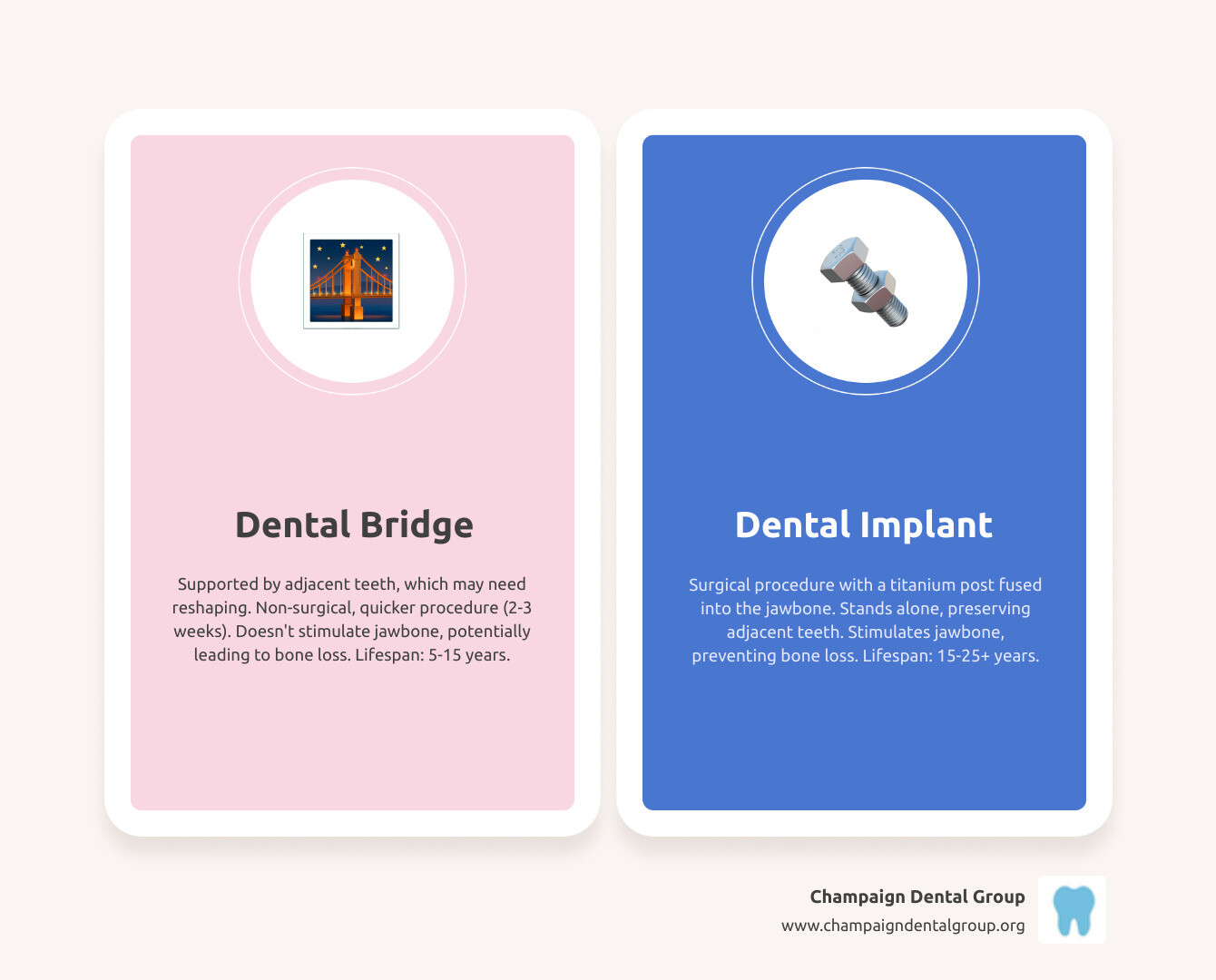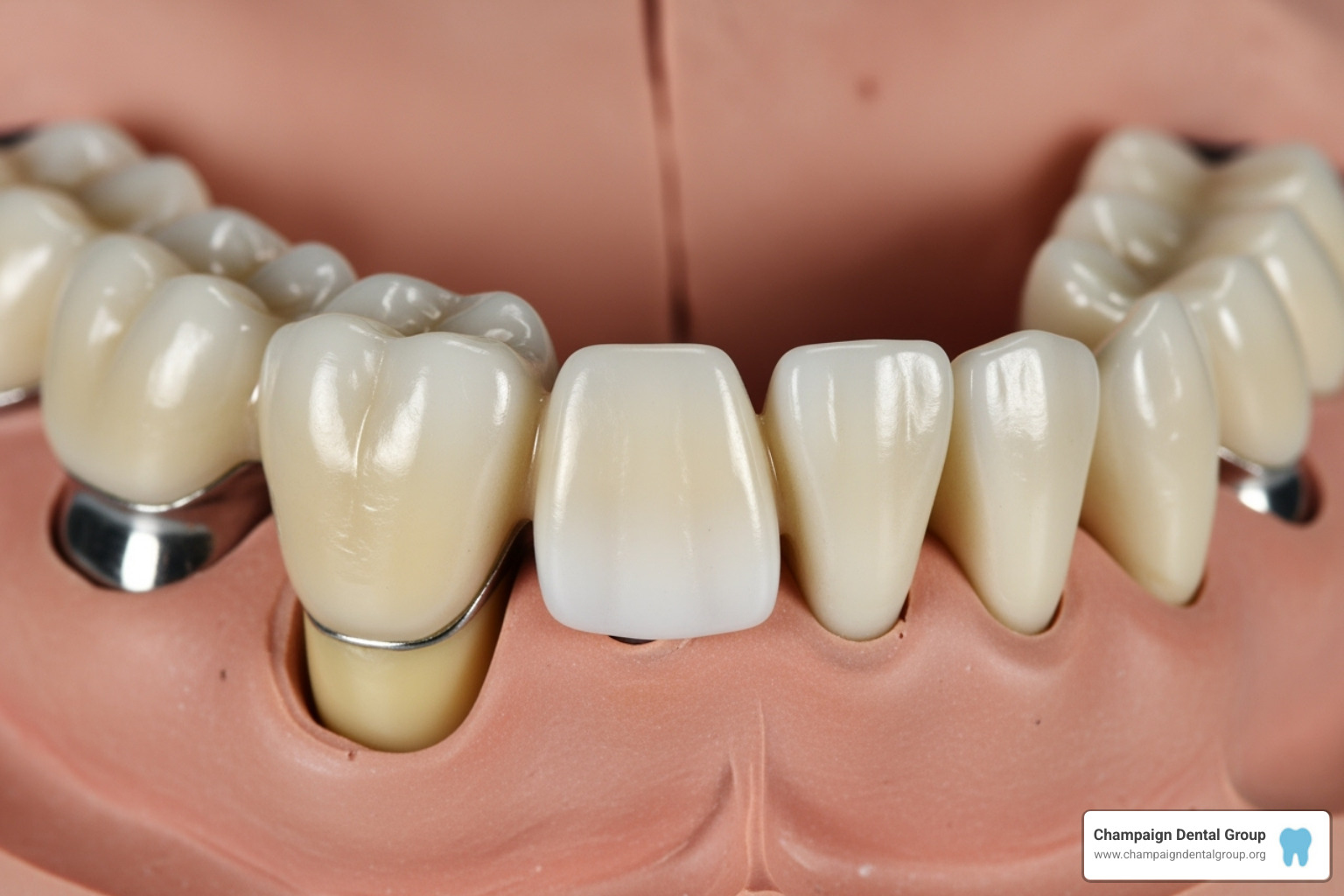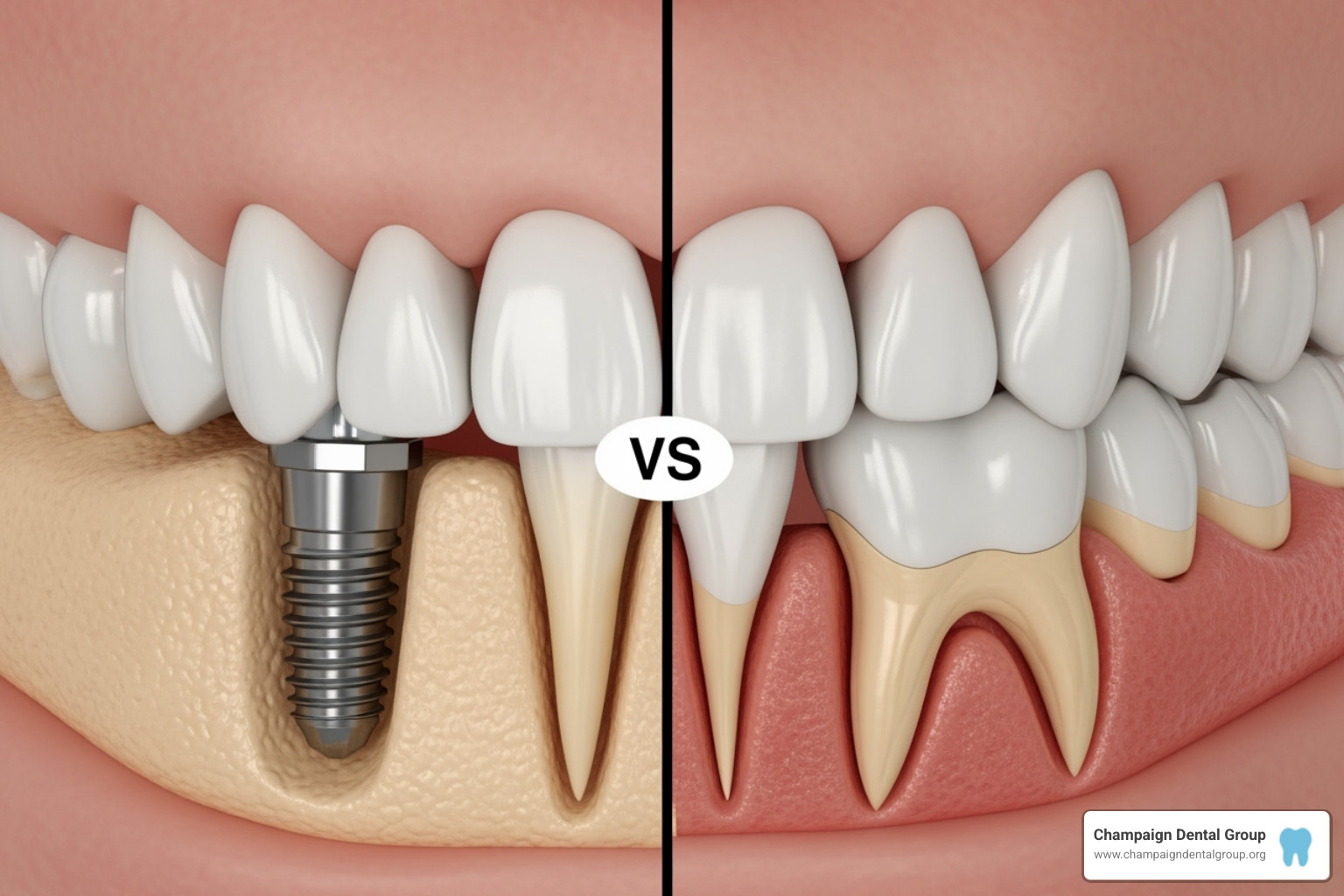Bridging the Gap or Planting Roots—Which Tooth Replacement Wins?

Understanding Your Options: Dental Bridge or Implant?
When you're facing a missing tooth, the choice between a bridge or implant can feel overwhelming. Both options restore your smile and chewing ability, but they work very differently. Here’s a quick look at the main distinctions:
| Feature | Dental Bridge | Dental Implant |
|---|---|---|
| How it Works | Artificial tooth supported by neighboring teeth. | Artificial tooth with a post surgically placed in jawbone. |
| Impact on Other Teeth | Requires reshaping healthy adjacent teeth. | Stands alone; doesn't affect surrounding teeth. |
| Bone Health | Doesn't stimulate jawbone; bone loss can occur. | Stimulates jawbone, helping to preserve bone. |
| Procedure | Typically non-surgical, quicker. | Surgical, requires healing time for bone fusion. |
| Longevity | Generally 5-15 years. | Often 15-25 years, can last a lifetime. |
Losing a tooth can affect your confidence, eating ability, and overall oral health. Thankfully, modern dentistry offers excellent ways to fill those gaps, providing solutions that are effective and fit your lifestyle.
At Champaign Dental Group, we understand these concerns. We're here to guide you with clear information and our signature compassionate care. Our goal is to help you find the best solution for your unique needs, ensuring your smile stays healthy and bright for years to come. This guide will help you understand the core differences, pros, and cons of each option.

What Are Dental Bridges and Implants? The Core Differences
When you're missing a tooth, you have two excellent options to restore your smile: dental bridges and dental implants. While both restore your confidence and ability to eat, they work in completely different ways.

Understanding Dental Bridges
A dental bridge does exactly what its name suggests: it bridges the gap left by a missing tooth. This solution uses the teeth on either side of the gap as anchors to hold an artificial tooth (a pontic) in place. Your dentist reshapes the healthy teeth on both sides of the space, called abutment teeth. These teeth are crowned to create strong anchors, and the artificial tooth is permanently attached between them, creating a solid piece that fills the gap.
Bridges come in various materials. Porcelain bridges are popular for their natural look, while gold bridges offer exceptional durability, especially for back teeth. There are four primary types of bridges. Traditional bridges are most common, while others like cantilever or Maryland bridges suit specific cases. Implant-supported bridges even use implants as anchors.
A key advantage is that bridges are a non-surgical option, offering a straightforward process to restore your smile quickly. At Champaign Dental Group, our experienced team ensures the bridge process is comfortable and efficient, reflecting our commitment to high-quality patient care. You can learn more about how we restore smiles through our Crowns and Bridges services.
Understanding Dental Implants
Dental implants take a different approach. Instead of relying on neighboring teeth, an implant creates its own foundation in your jawbone, much like a tree's roots. The process involves placing a small titanium post, an artificial root, into your jawbone. Your bone naturally fuses with the titanium post through a process called osseointegration.
This fusion creates incredible stability. Once healed, a custom crown is attached, resulting in a replacement that looks, feels, and functions like a natural tooth.
Implants require a surgical procedure, but our team at Champaign Dental Group has perfected this process since 1997. We use state-of-the-art technology and provide compassionate care to make the procedure comfortable and stress-free.
The bridge or implant decision depends on your situation, timeline, and preferences. Implants offer a natural, long-lasting solution. Find out if they're right for your smile on our comprehensive Dental Implants page.
Bridge or Implant: A Side-by-Side Comparison
When weighing your options, understanding the key differences between a bridge or implant is crucial. Both solutions restore your smile but offer different experiences in timeline, cost, and long-term outcomes.
| Feature | Dental Bridge | Dental Implant |
|---|---|---|
| Lifespan | 5-15 years | 15-25 years, often a lifetime |
| Cost (Upfront) | Generally lower | Generally higher |
| Procedure | Non-surgical, 2-3 weeks | Surgical, several months (healing) |
| Bone Health | No bone stimulation, potential bone loss | Stimulates bone, prevents bone loss |
| Impact on Adjacent Teeth | Requires reshaping of healthy teeth | Independent, no impact on adjacent teeth |
| Maintenance | More complex (special cleaning tools) | Like natural teeth (brushing, flossing) |
| Feel/Function | Can feel less natural, some food restrictions | Feels and functions like a natural tooth |
| Long-Term Value | May require multiple replacements | Excellent, often a one-time investment |
The choice between a bridge or implant is about finding the solution that fits your lifestyle, timeline, and long-term oral health goals.
Procedure and Timeline
Time is often a key factor. If you want your smile restored quickly, the timeline difference between a bridge or implant is significant. A dental bridge is faster, typically taking just two appointments over 2-3 weeks. This quicker solution without surgery appeals to many patients.
Dental implants require more patience, spanning several months for healing. This period is for osseointegration, where the jawbone fuses with the titanium post, giving the implant incredible strength. After three to six months of healing, we attach the custom crown.
Cost: Upfront vs. Long-Term Value
Choosing a bridge or implant requires looking beyond the initial price to understand the long-term value. A dental bridge usually has a lower upfront cost, making it an attractive immediate solution. However, dental implants often provide superior long-term value. While the initial cost is higher, they can last a lifetime with proper care. This longevity can save you money over time by avoiding the replacement costs associated with bridges.
At Champaign Dental Group, we believe quality dental care should be accessible. Our Smile Protection Plan helps make both bridges and implants more affordable. For more information, you can also explore your dental implants and insurance options.
Lifespan and Maintenance
Dental bridges typically last 5-15 years, depending on your oral hygiene and the health of the supporting teeth. Caring for a bridge requires special tools like floss threaders to clean underneath the artificial tooth.
Dental implants offer remarkable longevity, often lasting 15-25 years or more, sometimes becoming implants for life. Their durability comes from the implant's fusion with the jawbone. Implant maintenance is simple: care for them like natural teeth with regular brushing, flossing, and dental visits.
Impact on Your Oral Health
A crucial consideration is how a bridge or implant affects your oral health, especially your jawbone and adjacent teeth. When you lose a tooth, the jawbone can deteriorate from a lack of stimulation. Dental implants combat this by stimulating the jawbone. The titanium post acts like a natural tooth root, preventing bone deterioration. This bone preservation is a significant long-term health benefit.

Bridges fill the gap but don't stimulate the jawbone, so the bone underneath can still deteriorate. Another crucial difference is the impact on adjacent teeth. Placing a bridge requires permanently altering the healthy teeth on either side to support the crowns. Implants are independent and don't require altering adjacent healthy teeth, thus preserving your natural tooth structure.
Making the Right Choice for Your Smile
Deciding between a bridge or implant is a big decision, and there's no single "best" answer. The right choice depends on your health, goals, budget, and lifestyle. Our compassionate team at Champaign Dental Group is here to provide personalized care and walk you through your options so you can feel confident in your decision. To learn more, you can read about the advantages of dental implants.
When is a Dental Bridge the Better Option?
While implants have long-term perks, a dental bridge is sometimes the better option. A bridge is a non-surgical alternative for patients who are not candidates for surgery or prefer to avoid it. Regarding the timeline, a bridge is much faster, completed in a few weeks, while an implant takes months. For the initial budget, a bridge generally costs less upfront. Finally, if the teeth next to the gap already need crowns due to large fillings or decay, using them to support a bridge is a practical choice. Our team at Champaign Dental Group offers comprehensive services for Crowns and Bridges and will help determine if this is the right fit for you.
When is a Dental Implant the Preferred Choice?
For many patients, a dental implant is the top choice for long-term oral health and value. An implant is the most durable and long-lasting option, often lasting a lifetime with proper care. Implants also help keep your jawbone healthy. By acting like a natural tooth root, an implant stimulates the bone, preventing bone loss and preserving your facial structure. A key advantage is preserving your natural teeth, as implants are standalone and don't require altering healthy neighboring teeth. Despite a higher initial cost, an implant's long-term value is exceptional, often making it more cost-effective over time. Implants also look and feel almost exactly like natural teeth, providing superior comfort and a confident smile. Learn more about our Natural-Looking Dental Implants.
Key Factors to Consider When Deciding on a Bridge or Implant
Making the best decision is a team effort. At Champaign Dental Group, we'll discuss these key factors with you:
- Overall health: Your general health and medical history are important, as some conditions or habits like smoking can affect implant healing.
- Number of missing teeth: Whether you're missing one or several teeth will influence the best solution.
- Jawbone density: Implants require sufficient jawbone density. If bone loss has occurred, a bone grafting procedure can often make implants possible.
- Timeline: How quickly do you need your smile restored? A bridge is faster, while an implant is a longer process for a more permanent result.
- Financial planning: We'll discuss the investment for each option, considering both initial cost and long-term value. Our Smile Protection Plan can help manage costs.
- Aesthetic goals: Implants often provide the most natural look and feel, which can be a significant confidence booster.
Our commitment to compassionate patient care means we take the time to explain everything and answer your questions. Together, we'll create a personalized treatment plan that matches your needs and helps you achieve your dream smile.
Frequently Asked Questions about Tooth Replacements
When you're weighing your options between a bridge or implant, it's natural to have questions. At Champaign Dental Group, we believe informed patients make the best decisions. Here are the questions we hear most often.
Can I switch from a dental bridge to an implant later?
Yes, switching from a bridge to an implant is often possible. Because a bridge doesn't stimulate the jawbone, some bone loss may have occurred. We will perform a thorough jawbone assessment to check for sufficient bone. If needed, a bone grafting procedure can build up the area to create a strong foundation for the implant. During your consultation with a dentist, our experienced team will explain the process and what to expect.
Is a bridge or implant better for a front tooth?
For a front tooth, aesthetics are a top concern. Implants often provide the most natural look. They replace the entire tooth root, supporting the gum line and preserving adjacent teeth. The bone support also helps maintain your facial structure. The result is a replacement that looks and feels completely natural. Bridges offer faster results, restoring your smile in just a few weeks. However, they require altering adjacent teeth and don't prevent bone loss, which can affect the long-term aesthetics. The best choice depends on whether you prioritize immediate results or the most natural long-term outcome.
Does getting a dental implant or bridge hurt?
We understand this concern, and our commitment to compassionate patient care means your comfort is our priority. Modern dentistry makes both procedures very comfortable. We use effective local anesthesia to ensure you feel no pain during treatment. For an implant, you can expect minimal discomfort afterward, similar to a tooth extraction, which is easily managed with over-the-counter pain relievers. Bridge procedures are non-surgical and even gentler. We provide detailed post-procedure care instructions and support to ensure your recovery is as smooth and comfortable as possible.
Conclusion: Invest in a Smile That Lasts
Choosing between a bridge or implant is a significant decision for your health and well-being. A dental bridge offers a quicker, less invasive solution with a lower initial cost, but it requires altering adjacent teeth and doesn't prevent jawbone loss. A dental implant is a more comprehensive, durable solution that preserves jawbone health, protects your natural teeth, and can last a lifetime, offering exceptional long-term value and a natural feel.
The best choice is a personalized one, based on your health, budget, lifestyle, and goals. At Champaign Dental Group, we are committed to providing the highest quality, compassionate patient care. Using state-of-the-art technology, we ensure precise, effective treatments. Our Smile Protection Plan can help make care more affordable.
Serving Champaign, Urbana OH, and Champaign County OH since 1997, we take the time to listen and guide you. Let our dedicated team help you invest in a smile that lasts a lifetime.
.jpg)